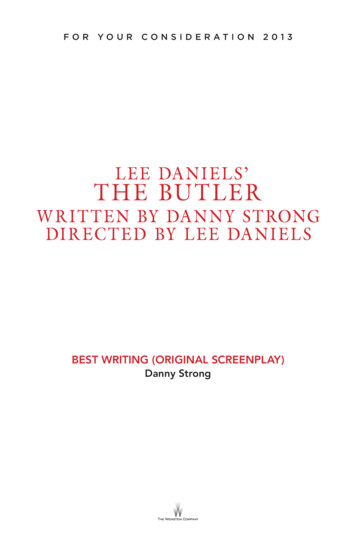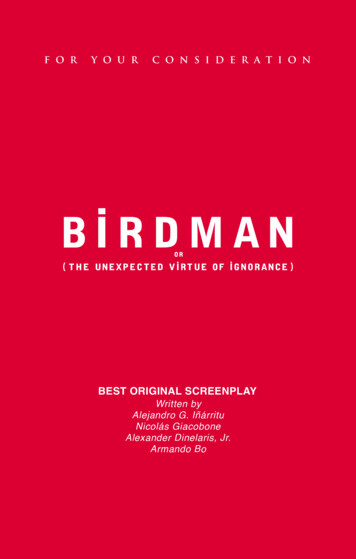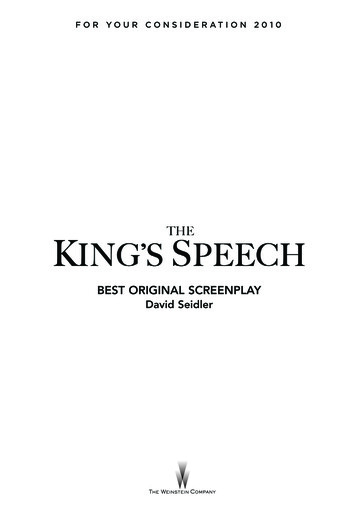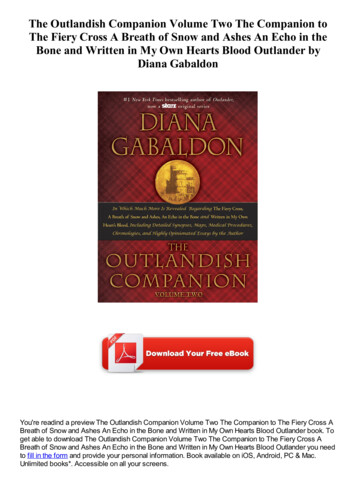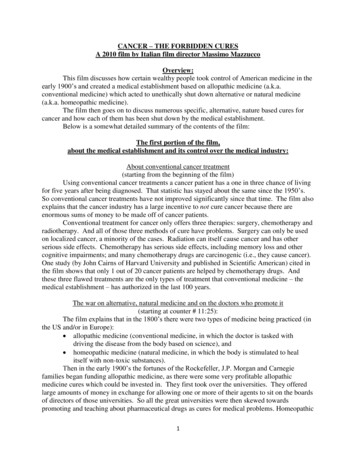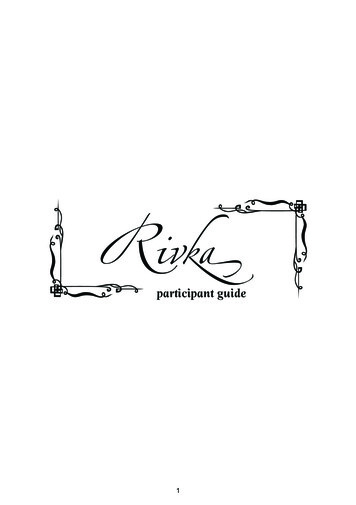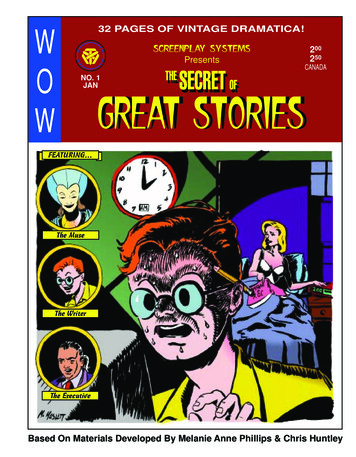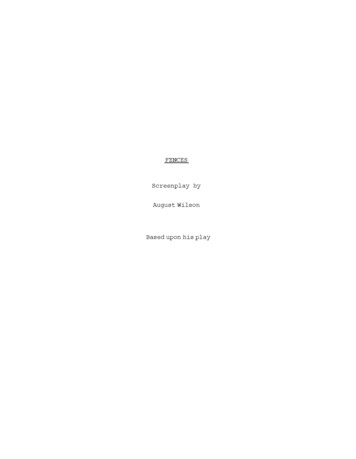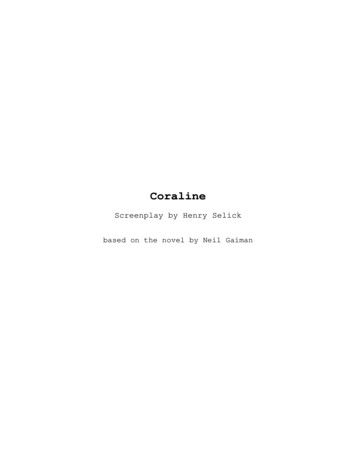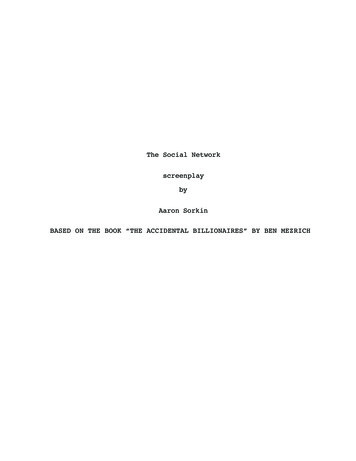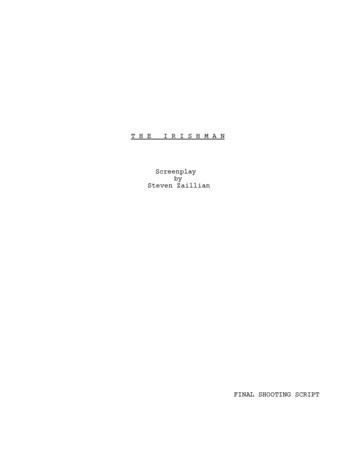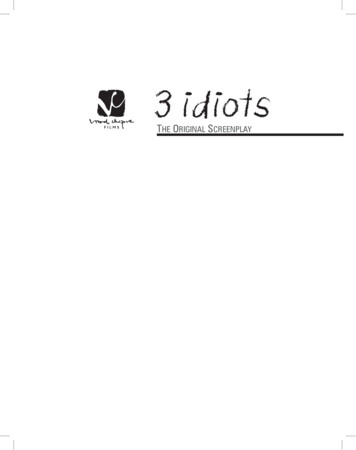
Transcription
THE ORIGINAL SCREENPLAY
THE ORIGINAL SCREENPLAY
First published in 2010Corporate & Editorial OfficeA-12, Sector 64, Noida 201 301Uttar Pradesh, IndiaPhone: 91 120 477 4100Sales Office4379/4B, Prakash House, Ansari RoadDarya Ganj, New Delhi 110 002, IndiaPhone: 91 11 2326 3363, 2326 5303Fax: 91 11 2327 8091Email: sales@ombooks.comWebsite: www.ombooks.com VINOD CHOPRA FILMS PVT. LTD.www.vinodchopra.comCover visuals VINOD CHOPRA FILMS PVT. LTD.Film poster on front cover by Rahul Nanda (H-One)Conceptualised & Compiled by Smriti KiranCover Design by Sneha PamnejaBook Design by Shraboni RoyTypeset by Mindways Design, New DelhiALL RIGHTS RESERVED. No part of this book may be reproduced or transmitted in anyform by any means, electronic or mechanical, including photocopying and recording, or byany information storage and retrieval system, except as may be expressly permitted in writingby the publisher.ISBN: 978-93-80070-18-610 9 8 7 6 5 4 3 2 1Printed at Replika Press Pvt. Ltd., India
CONTENTS7Acknowledgements9Introduction: Rajkumar Hirani21319The Original ScreenplayThe Method in the Madness:345Things of Beauty: Abhijat Joshi357Casting a Spell: Smriti Kiran385Opening Credits391End Credits409Profiles421Publisher’s NoteCONTENTSRajkumar Hirani, Abhijat Joshi, &Vidhu Vinod Chopra Recollect: Smriti Kiran
ACKNOWLEDGEMENTSIndia produces about 800 films every year but not even eight get documented.There is no reading material available for film students or film lovers on the behindthe-scenes action, the vision of the filmmakers, and the processes involved in makinga film. Lage Raho Munnabhai: The Original Screenplay was published last year.3 Idiots: The Original Screenplay is our second attempt in this direction. This bookis not just the screenplay; it is also a peek into the minds of its makers.I would like to thank Smriti Kiran who took the initiative to come up with thisbook within 5 months of the release of the film. She has spent many long daysand long nights chasing the cast and crew, writing and rewriting, with a smile onher face. Without her persistence, this book would not have happened.I would also like to thank Ajay Mago and his team at Om Books International forgiving shape to our vision.I also wish to thank Maheep Dhillon for tirelessly redrafting the screenplay; SupriyaKelkar for her eye for detail; Rohan Mapuskar for poring over the dialogues;Dileep Desai, Amit Gulati, Mustafa Neemuchwala, Teja Pratap, Insia Lacewalla forproduction support; Anupama Chopra for her invaluable insight.And Vinod Chopra for clearing all obstacles as always.— Rajkumar Hirani02 Acknowledgements.indd 75/31/2010 1:46:14 AM
02 Acknowledgements.indd 85/31/2010 1:46:17 AM
INTRODUCTION03 Introduction.indd 9INTRODUCTION5/31/2010 1:47:14 AM
03 Introduction.indd 105/31/2010 1:47:17 AM
Every story has a back story and so does mine.My father, Suresh Hirani, was fourteen years old when he along with the familymoved to India during Partition. Initially, they took shelter in refugee camps inAgra and later shifted to Ferozabad. He had lost everything so education was lowon the priority list. There were more pressing and immediate concerns like food,clothes, and shelter to worry about. To make ends meet, my father started workingin a bangle factory where he painted patterns on bangles. Later, he began sellingice-cream on the streets. Despite compelling and adverse circumstances, his thirstfor knowledge did not wane.My father’s sister, who was married in Nagpur, got him a job there in a generalstore as a store attendant. The city brought with it opportunity. My father enrolledhimself in night school. Work in the day and classes at night continued and hesomehow managed to graduate. Fortified with a degree and some savings, he wasitching to grow. So when a friend suggested that typewriters, which were new atthe time, were the future, my father decided to explore this avenue. He investedhis life’s savings, borrowed the rest of the money needed and opened a typewritinginstitute which was referred to as a ‘Commerce Institute’ then. My father christenedit ‘Rajkumar Commerce Institute’. I was not even born then. So now you knowthat I was named after a typewriting institute and not the other way round! Mostparents would name their enterprises after their children, but I’ve had the rarehonour of being named after my father’s enterprise. I’m proud of that fact.My father’s business flourished. He got married and I was born soon after. Theplan was to get into engineering but I didn’t have enough marks in my highersecondary exams (12th standard) to make the cut so I studied commerce. I hadalso enrolled in this foundation course for chartered accountancy simultaneously,the classes for which were held in the evenings. At the end of the foundation03 Introduction.indd 115/31/2010 1:47:17 AM
course, the exams for chartered accountancy were to be held. I despised theseclasses from the very beginning. I had no interest in chartered accountancy andthese classes were a huge imposition, both in terms of time and the fact that I waswasting this time on something I knew was not for me. But I had the baggage ofthe engineering debacle on my head so abandoning this very viable option wouldhave appeared self-indulgent, foolish, and luxurious at the time. I was afraid IRajkumar Hirani with his father, Suresh Hirani.Photo Credit Himmat Singh Sekhwat, Tehelkawould hurt my parents and also somewhat scared to take this step that could harmmy ‘future’. I carried on with the charade.Subconsciously, I was aware that there were some set presumptions about my future.I was expected to either become a chartered accountant or take over my father’sbusiness. Both possibilities mortified me. Though at that point in time, I was notthinking about what would make me happy. Like any normal person, I hadresponsibilities and the usual concerns that range from job to future to career. As1203 Introduction.indd 125/31/2010 1:47:17 AM
the time for the foundation course’s exams drew close, I would often wake up inthe middle of the night in cold sweat.Finally, the exams were upon me. I realised that there was no escaping the inevitable.It was imperative to tell my father that I found a root canal procedure more excitingthan chartered accountancy. Even after twenty years, that evening is as clear in myhead as if it had happened just yesterday.It was a regular evening in Nagpur but for me it was going to be the most significantand decisive evening of my life. My father was standing alone in the living room.I walked in and walked up to where he was standing, taking lead-laden steps. Mythroat was dry with uncertainty and fear. It was one thing to tell your father thatyou did not want to pursue what seemed like an excellent career choice but it wasanother thing to not offer an alternative plan. The only thing I was clear aboutwas that chartered accountancy was not my cup of tea. My voice quivered withapprehension as I told him that I did not want to take the exams because I didnot enjoy chartered accountancy at all. He looked at me and then in the mostnonchalant manner told me to not do it and join his office starting next morning.It was as short and simple as that. I was ecstatic. The weight of the world had liftedfrom my shoulders. I felt free. This happened during the period leading up to thefestival Makar Sankranti which is known for kite flying. I remember running upto our terrace right after ‘the conversation’ and flying kites with this silly grin onmy face. Now, the kite flying seems almost like a symbol for the sense of freedomand relief that had swept over me that day.My commerce classes in college occupied only four hours of my time in themorning (7 am to 11.00 am), so the rest of my time was devoted to helping myfather with his business (11.30 am to 6.30 pm) which had graduated from typingcourses to repairing and selling new kinds of calculators and other office equipment.I immersed myself in it with the gusto of a man who had just been extracted fromthe gallows. I used to teach typing, go out and give demos to prospective clients,and repair spoiled units. I was even sent to Delhi to do a course in repairingelectronic calculators.This is the period where I had my first brush with theatre. I met Narendra Thakurand a few other students who used to perform and produce plays regularly at ourcollege. I joined them. (Before this, my only experience on stage was in the 9thstandard. I was cast in the role of ‘Noorjahan’ in a play.) I became a regular withthe theatre gang. Abandoning the foundation course opened up my evenings to1303 Introduction.indd 135/31/2010 1:47:22 AM
be occupied, and occupied they were with writing, reading, and brainstormingabout plays. This stirred something within me. I have always believed that thereare two approaches to learning: one is to study something academically and theother is to get interested in something and then start to gather material on it andlearn about it. The latter is always a more gratifying experience. I would hunt forHindi plays in quaint bookshops. I would devour anything on theatre. We wouldparticipate in competitions, youth festivals, and travel to any place that evenhinted at an opportunity for exposure in the field. Youth festivals were a platformwhere teams from all the colleges in Nagpur came and performed. At one suchfestival, I met another theatre group which was performing for the Nagpur MedicalCollege. There were a few people in that group, especially Debashish Naha, whowere passionate about theatre and took this enterprise very seriously. There wasan instant connection with Debashish and soon our friendship led to my theatregroup merging with his to form a new theatre group called Awaaz. Debashish andI would spend hours working on plays. He would get me plays written in BanglaFinding his voice . performing on stage (middle) for Awaaz, in Nagpur.1403 Introduction.indd 145/31/2010 1:47:22 AM
and we would sit down and translate them in Hindi. We started putting up playsunder our banner. Personalities such as Marathi theatre-director Kishore Kulkarni,who had received acclaim on stage were invited to direct plays for our group. Welearnt under many such people who had a command over their craft and a naturalflair for the medium. Since everyone was busy till 6 pm everyday, we used to meetafter that. These meetings were held either at the Bengali Association Hall or at theSindhi Gurudwara nearby which had a hall, or at the local school hall. Whereverwe found some empty space, we parked ourselves. The rehearsals used to go ontill midnight.We pursued this with such passion that theatre soon became an obsession. Wemanaged to put up a record three to four plays a year. These plays were not restrictedto performing at colleges. We started putting up ticketed shows. Apart from thecreative aspect, the entire production of the play was handled by us. We organisedeverything from booking the hall, putting up the sets, props, costumes, accounts,and even ticketing. Watching plays was not the preferred pastime in Nagpur, so weused to sell the tickets to friends and relatives. Accounts were maintained diligently.In fact, I still have some of the accounts from those days. We used to barely coverour production costs and that is all we wanted. We were not doing this for profit.We just wanted to be able to put up plays and hoped to cover costs and use themoney to put up the next one. On those rare occasions, if anything was earned overand above the production cost, it ensured a grand meal for our entire group.It was not difficult to speak to my father the second time. Intuitive and observant,he was not blind to my growing passion for theatre. The suggestion to tread thispath in earnest came from my father. He told me to enrol in a program to getformal education (my father is a great believer in learning) in the field of writing,directing, and storytelling. The natural choice was to apply to the Film and TelevisionInstitute of India (FTII).My first attempt (1983) to get into FTII in the direction course was unsuccessful. Ihad very little knowledge of the exam and the enrolment procedures. I had travelledto Mumbai to take the exam. There I learnt that the entrance exam for FTII wasexactly like bank exams, and anyone studying for it would clear it without blinking. Ialso realised that seats for the direction course were few and almost everyone appliedfor this course. I came back to Nagpur and enrolled myself in the Faculty of Law asthat seemed like a reasonable option if things did not work out. Alongside, I startedpreparing for the FTII exam. The next year (1984), I applied again to FTII but1503 Introduction.indd 155/31/2010 1:47:30 AM
Learning the grammar of cinema . at FTII.this time for the editing and not the direction course. I got admission. The day Ireceived the telegram, informing me about my admission to FTII, was the happiestday of my life. I was delirious with joy. I thought I had arrived and my life wasmade. This thought stemmed from naiveté. Sitting in Nagpur, I had only heard ofthe ten to fifteen names of really successful people who had graduated from FTIIso I assumed that getting admission meant I was set up for life. I looked at myadmission in the Institute as one looks at getting into law school or engineering.Once you get in and work hard, the moment you graduate, you become a director.All these illusions were shattered two days into my time at FTII. My enthusiasmwas replaced by an inferiority complex. I was from a small town in the midst ofstudents waxing eloquent about theories, films, and ideas that were Greek andLatin to me. It took me time but I found my feet again and got my voice back.It taught me a very important lesson: you cannot lose yourself just by perceivingyourself to know less. If stereotypes have to be broken, then first they have to bebroken within you.1603 Introduction.indd 165/31/2010 1
I was cast in the role of ‘Noorjahan’ in a play.) I became a regular with the theatre gang. Abandoning the foundation course opened up my evenings to 003_Introduction.indd 133_Introduction.indd 13 55/31/2010 1:47:22 AM/31/2010 1:47:22 AM. 14 be occupied, and occupied they were with writing, reading, and brainstorming about plays. This stirred something within me. I have always believed .
